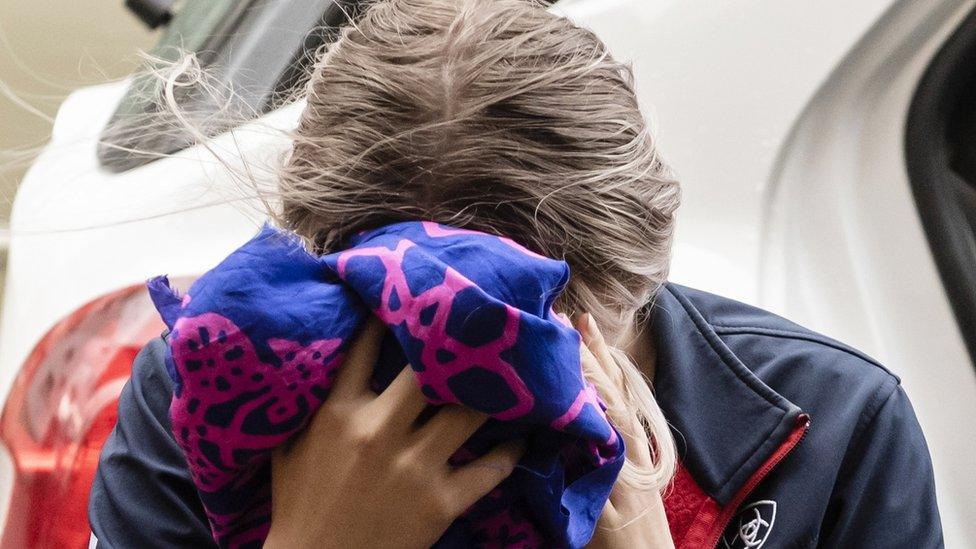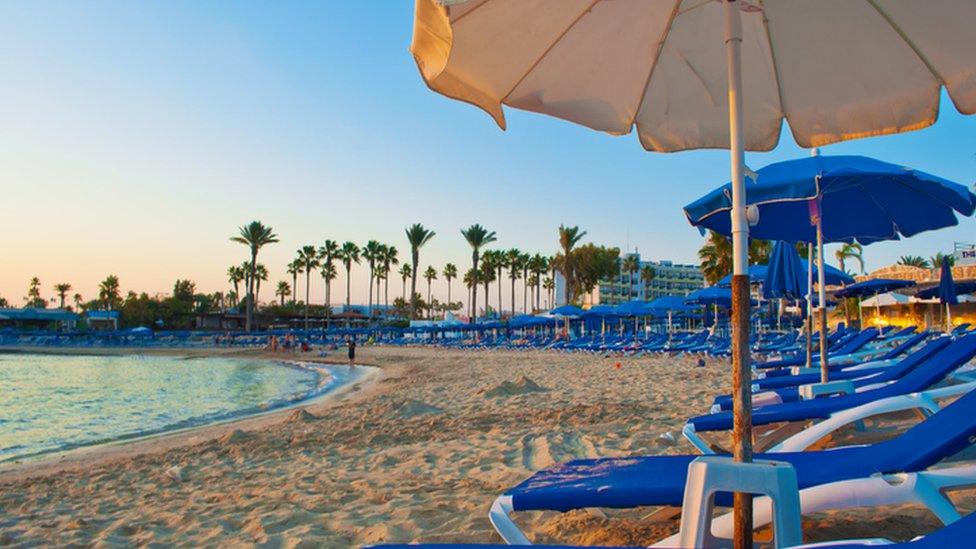Ayia Napa: Foreign Office 'concerned' over Briton found guilty over rape claim
- Published

The woman covered her face as she arrived to hear the verdict
The UK is "seriously concerned about the fair trial guarantees" in the case of a British woman convicted of lying about being gang-raped by 12 Israelis in Cyprus, the government said.
A Foreign Office spokesman said the case in Ayia Napa was "deeply distressing" and it will raise the issue with Cypriot authorities.
The teenager was found guilty on a charge of causing public mischief.
She had been arrested after recanting a claim that she was raped in July.
The 19-year-old had said Cypriot police made her falsely confess to lying about the incident at a hotel - but police denied this.
The judge at the Famagusta District Court in Paralimni adjourned sentencing until 7 January. She could face up to a year in jail and a £1,500 fine, but her lawyers have asked for a suspended sentence.
Lawyer Michael Polak, director of Justice Abroad which is assisting the woman, told BBC News that they will appeal the conviction.
He said the retraction statement was given when no lawyer or translator was present, which he said was a breach of European human rights law.
He also criticised the handling of the case by Judge Michalis Papathanasiou, who he said refused to hear any evidence about whether the alleged rape took place.
Lawyer Michael Polak described it as "a very worrying conviction"
Prosecutors said the woman willingly wrote and signed a statement retracting her claims 10 days after making the initial allegation.
The woman told the court this happened under duress with the threat of arrest.
As he delivered the verdict, Judge Papathanasiou said: "The defendant gave police a false rape claim, while having full knowledge that this was a lie," adding that the teenager had tried to "mislead" the court in her testimony.
He said "there was no rape or violence" and police had thoroughly investigated, "making all necessary arrests."
The judge said his decision was backed up by video evidence showing the 19-year-old having consensual sex and she "initially gave false statements" because she "felt embarrassed" when she realised members of the group were recording her.
Her lawyers had argued that the video found on some of the Israelis' phones showed her having consensual sex with one of the group while others tried to enter the room as she told them to leave.
The mother of the teenager has called the verdict "absolutely astonishing" and "a nightmare".
In an interview with ITV News, she said: "I find myself kind of unable to believe the violations of human rights she's experienced throughout the whole affair, particularly things like having no access to lawyers whilst being interrogated for hours on end over a Saturday night."
She said in contrast, the Israeli group had "legal representation within a matter of hours".
She added her daughter "seriously needs" to return to the UK for medical treatment for her post-traumatic stress disorder.
One of the woman's lawyers, Nicoletta Charalambidou, told reporters they planned to appeal against the decision to Cyprus' Supreme Court, and if that failed they would take the case to the European Court of Human Rights.
She said they "respectfully disagree" with the verdict, adding there had been "violations" of procedure and her client's rights to a fair trial.

Analysis
James Landale, diplomatic correspondent
It is unusual for the Foreign Office to comment publicly on active legal proceedings against British nationals overseas.
Officials normally want to avoid accusations of interference in the courts of a sovereign nation.
Instead, they sometimes try to exert pressure quietly behind the scenes.
So the fact the Foreign Office has chosen to intervene publicly is interesting.
They may be calculating that a little public pressure now could have an impact on the sentencing decision by the judge next month.
He could, for example, give the unnamed British woman a sentence equivalent to the more than four weeks she has already spent in a Cypriot jail.
Certainly the FCO has been following this case very closely: staff have visited the woman a number of times during her detention, they have attended court hearings, and have been in regular contact with her legal representatives and the local authorities.
There may also be political considerations: this is a high-profile case and the freshly-elected UK government may wish to be seen to be doing something to defend a British national facing what supporters claim is a miscarriage of justice.

The teenager had contacted police hours after claiming to have been raped on 17 July at the Pambos Napa Rocks Hotel.
Twelve men were arrested in connection with the allegations but were later freed and returned home, after the woman retracted her claims.
She was later arrested and appeared in court facing charges of public mischief by falsely accusing the group of raping her, to which she pleaded not guilty.
The trial began at the start of October - with the verdict delayed until now.
- Published19 December 2019
